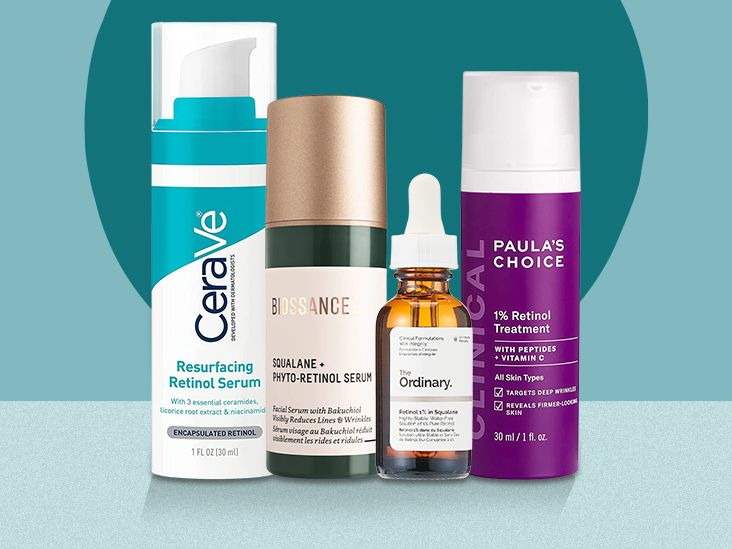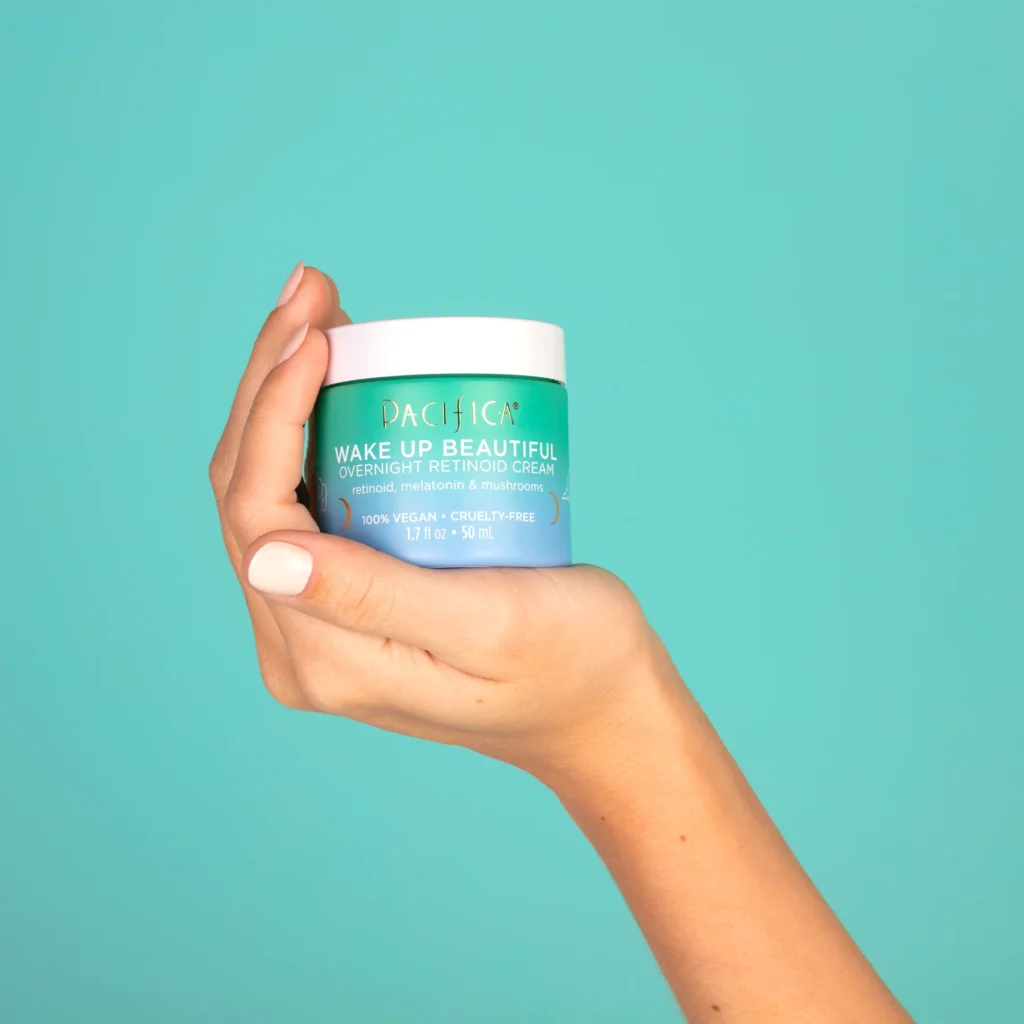Skin creams, lotions, and serums often include retinol, a kind of vitamin A. It can assist get rid of acne and has antiaging properties. Stronger retinoid concentrations are available via prescription, but retinol-containing products are often accessible over-the-counter.
What is retinol?

One of the various applications of vitamin A in skin care is retinol. It contains anti-aging properties and is used to treat acne. Retinol is available without a prescription over-the-counter. You can also see your doctor to find out how best to include retinol into your beauty regimen. Higher concentrations of retinoids than what you can get over-the-counter may be prescribed by your doctor.
As a topical therapy, retinol is applied topically to the skin. There are various types of retinol, such as:
- Gels, creams, lotions, and ointments.
- serums.
- Additionally, retinol is occasionally used to cosmetic goods.
What does retinol do for your skin?
Retinol promotes the growth of skin cells. It aids in pore cleaning. In addition to exfoliating your face, retinol boosts the synthesis of collagen, which helps minimize the look of fine lines and wrinkles and leave your skin looking more youthful and plump.
What are the different types of retinol products
“Topical” refers to medications that are used topically. There are numerous topical retinoid products on the market, such as:
- Adapalene (Epiduo®, Differin®).
- Pantretin®, or alitretinoin.
- Targretin®, or bexarotene.
- Tazarotene (Avage®, Tamarac®).
- Tretinoin (also known as Tretin-A, Tretin-X, Refissa, Renova, and Atalin).
How long does it take retinol to work?
Although retinol begins to act on your cells immediately, it will take a few weeks before you notice a change in the texture and appearance of your skin. In fact, while you become used to the new routine, your skin condition can first appear worse.
What does retinol treat?
Numerous retinol solutions available without a prescription are advertised as improving skin look. Should these be ineffective, you may speak with a dermatologist—a physician who focuses on skin disorders—about more potent prescription-only options. According to studies, topical retinoids can be used to treat stretch marks, acne, and acne scars. Retinol has anti-aging properties as well. In particular, retinol helps with the following ailments:
Retinol for acne

One prevalent skin ailment is acne. You may get blackheads, whiteheads, or other types of pimples when dead skin cells and/or oils clog your pores. Retinol treats acne by keeping pores from getting clogged. During the first few months of treatment, you can still have pimples; in fact, your skin might look worse (this is frequently referred to as the retinol purge). But you’ll notice clearer skin if you persevere.
Retinol for acne scars
Scars from acne are the result of inflammation and damage. These weeks-long, pink, red, or dark spots on your skin may develop as your acne heals. Furthermore, popping or picking at zits inflicts extra damage to the skin and may result in long-lasting scars. Topical retinol treatments can help stop more breakouts and lessen the swelling and inflammation that accompany them. But severe acne scars that are elevated or sunken may not always respond well to topical retinol treatment.
Retinol for dark spots
Sun damage to your skin can lead to the development of dark spots, often known as hyperpigmentation. The accumulation of melanin, which gives your skin its color, is what causes light to dark brown spots on your hands, arms, neck, or face (pigment). These spots, which are also known as sun spots, age spots, and liver spots, are painless, but if you’re not happy with the way they look, procedures and topical treatments could be helpful. Although it takes months and can irritate your skin, some people find that topical retinol lightens their skin spots. If you’re worried about dark spots, it’s a good idea to contact a dermatologist—a medical professional who specializes in skin issues.
Retinol for large pores
A pore is a hole on the skin’s surface through which oils and body hair can come through. Your pores enlarge and become more visible when they are clogged with oil or dead skin cells. By promoting skin cell turnover, which thickens your skin, and halting the formation of clogged pores, topical retinol cures big pores.
Retinol for Kaposi sarcoma lesions
A uncommon malignancy that can strike those with compromised immune systems is called Kaposi sarcoma. Individuals who have Kaposi sarcoma frequently get bumpy or flat, dark-colored spots or blotches. They could be purple, pink, red, black, blue, or black. One retinoid that can reduce the growth of Kaposi sarcoma cells is alitretinoin. Your doctor can advise using alitretinoin gel to your Kaposi sarcoma lesions to slow down their progression, even if it is not a cancer cure.
Retinol for melasma
Another common skin condition that causes dark patches or blotches on sun-exposed areas is melasma. Melanin production is increased by exposure to light, heat, and specific hormone levels. This results in the formation of light brown, dark brown, or blue-gray, freckle-like spots. Pregnancy is when melasma most frequently occurs. Consult your healthcare professional before using any oral, topical, or supplement medications or supplements if you are pregnant. Topical retinoid, or retinoin, may help lighten melasma spots if you are not pregnant.
Retinol for psoriasis
People with psoriasis suffer from a skin condition marked by inflammation that accelerates the growth of new skin cells. The accumulation of new cells results in a pink or red, thick, scaly rash. Topical retinol may ease the rash by reducing inflammation and slowing the formation of new skin cells. However, your doctor will typically advise combining retinol with topical steroids because retinol can exacerbate skin irritation.
Retinol for stretch marks
Scars known as stretch marks appear on your skin when you are pregnant, gain weight, lose a lot of weight, or have rapid muscle growth. These marks begin as pink, crimson, or purple and progressively turn silver or white over time. Stretch marks can be less obvious with topical retinol, but before using it while pregnant or nursing, consult your healthcare professional.
Retinol for wrinkles
There are several things that might lead to wrinkles in your skin. Your skin cells divide more slowly as you get older. Your skin’s dermis, or middle layer, starts to weaken, losing its ability to hold onto moisture and producing fewer collagen and elastin. By decreasing the rate at which collagen breaks down and increasing the elasticity of your skin, topical tretinoin and tazarotene can help minimize the appearance of fine lines and wrinkles. Typically, using topical retinol for several months is necessary to observe any change.
Is retinol good for your skin?
Retinol is an effective treatment for acne and aged skin, but not everyone should use it. Try skincare products with different antiaging or skin-clearing components if you have sensitive skin or are prone to allergies. Crucially, retinol increases your skin’s sensitivity to sunlight, so when using retinol products, make sure to wear sunscreen and stay out of the sun as much as possible.
Procedure Details
How do you use retinol?

Try a small amount on a small area of skin (a patch test) before using a retinol product for the first time to determine if you have any adverse reactions. You can incorporate retinol into your nighttime skincare routine if, after a few days, your skin patch isn’t too red or itchy.
Apply retinol according to the directions on the package or as advised by your healthcare provider. These are the general actions you take:
- After using a mild cleanser, pat dry your skin. Avoid cleaning your skin with retinol products.
- Spread retinol thinly over your face, taking care to avoid getting it in your eyes, nose, or mouth. A dose the size of a pea is what you should use. Apply retinol only once every other day for the first few weeks of treatment.
- Apply a noncomedogenic face moisturizer to seal in your pores.
How often can you use retinol?
It’s advisable to start slowly because retinol might irritate your skin. You may use a product once every few days following a patch test, and then progressively increase to once or twice daily. Redness, itching, or burning may occur initially, but these symptoms go diminish as your skin adjusts to the treatment.
Risks / Benefits
What are the benefits of retinol?
Numerous skin-clearing and antiaging properties of retinol exist. Retinol lessens inflammation, avoids clogged pores, delays the synthesis of melanin, and makes your skin thicker and more elastic.
What are the side effects of retinol?
The majority of topical retinol side effects are transient. Among them are:
- itchy, dry skin.
- Burning or itching.
- skin that is flaky, scaly, red, or peeling.
- sunburned skin.
As the new treatment settles in and your skin adjusts, these adverse effects should eventually disappear.
How can you manage the side effects of retinol?
Tiny changes to your skincare regimen could help lessen the redness and irritation that retinol use can cause. It could be beneficial to:
- At a time, use just one retinol product.
- Instead of using retinol daily, use it every other day.
- After cleansing your skin, wait half an hour before using a retinol product.
- If you have damaged skin, sunburned skin, or other skin irritations, stay away from retinol products.
- Wear hats and clothes that protect you from the sun, along with SPF 30 to minimize your exposure to the sun.
- When should you apply moisturizer as part of your skincare routine? Ask your healthcare professional.
Can retinol damage your skin?
Retinol increases your susceptibility to sunburn, which can harm your skin. Skin cancer growth may also be linked to the use of excessive dosages of retinol. If you use retinol products, make sure to apply sunscreen and protect yourself from direct sunlight with caps and clothing.
When To Call the Doctor
When should I see my healthcare provider?
Speak with your physician if:
- You have a bad reaction to a product that contains retinol.
- After using an over-the-counter retinol product for a few months without seeing benefits, you want to think about your options.
Additional Details
What’s the difference?
It might be challenging to stay informed about the many retinol products available on the market.
Retinol vs. vitamin A
Vitamin A is a fat-soluble vitamin that is present in a wide range of foods and supplements and is essential to numerous bodily functions. It supports your organs and plays a part in immunity, eyesight, and reproduction. One type of vitamin A that can be applied topically to the skin to improve tone and texture is retinol.
Retinoid vs. retinol
Vitamin A derivatives such as retinoid and retinol are used to enhance the look and feel of skin. Their strength is the primary distinction. Many over-the-counter products include retinol, including lotions, serums, and even cosmetics. With one significant exception, retinoid products are created at greater concentrations and are only available with a prescription. Adapalene (Differen®) is available at your neighborhood pharmacy. It’s a retinoid that’s applied to acne.
Prescription retinoid vs. over the counter retinol
The concentration of active components in prescription retinoids is higher. Therefore, you might notice more noticeable changes to your skin more quickly if you visit your doctor and acquire a prescription-strength retinoid. Retinol obtained over-the-counter is typically mixed with other substances. Determining the amount of active component present can be more difficult. However, the other components in retinol over-the-counter medications might also brighten and moisturize your skin.
Tretinoin vs. retinol
One retinoid that is only available with a prescription is trenoin. It has been used for decades to treat acne and photoaging, or the early aging caused by sun exposure. It might function more quickly because it is stronger than retinol that is available over-the-counter.
Can you use retinol while pregnant or breastfeeding?
See your doctor before taking any new goods, supplements, or prescriptions if you are expecting or nursing a baby.
Topical retinol during pregnancy
Retinoids can result in birth malformations (congenital disorders) when taken orally. According to some research, applying a drug topically may reduce its absorption and bloodstream penetration. However, there are cases where a birth parent’s topical retinoid use results in the baby having congenital abnormalities at birth. Pregnant women are advised not to use retinoids as there are safer and more effective alternatives to address skin issues. If you take retinol creams, discuss birth control options with your doctor if you intend to become pregnant.
Topical retinol use and breastfeeding
Topical retinoid is used topically, thus not much of it enters your bloodstream. Medical professionals think there is little risk to nursing babies. Even topical supplements and medications should be discussed with your healthcare professional at all times if you are nursing a baby. If you choose to use topical retinoids, be sure not to get any on your breasts and to avoid getting any on your baby’s skin.
Can you combine retinol with other topical skin treatments?
It is possible to mix and match retinol with other topical skin treatments. But you should proceed with caution as several treatments have the potential to irritate your skin.
Retinol and glycolic acid
Alpha-hydroxy acids come in the form of glycolic acid, which functions as a chemical exfoliator. Glycolic acid and retinol alternates may be effective in lessening the visibility of acne scars and dark patches. But your skin may become irritated by both of them. Try switching up the days you use the products, or use retinol at night and glycolic acid in the morning.
Retinol and hyaluronic acid
A fantastic moisturizer, hyaluronic acid works by delaying the loss of water from your skin. It calms and plumps your skin, helping to mitigate some of the irritated effects of using retinol.
Retinol and niacinamide
A vitamin B3 derivative called niacinamide helps lessen the appearance of age and clean up acne. It may also help mitigate the irritant side effects of retinol and protect your skin.
Retinol and salicylic acid
Salicylic acid and retinol are both used to treat acne. However, they can also cause skin irritation and drying. Excessive dryness of the skin can lead to increased sebum production and exacerbate acne. Try alternating the use of salicylic acid and retinol if you’d want to: Use retinol at night and salicylic acid in the morning.
Retinol and vitamin C
Vitamin C can help minimize wrinkles and fine lines, as well as brighten dark spots. Your skin will appear tighter and plumper because retinol promotes elasticity and slows the breakdown of collagen. The mixture may aid in balancing out your skin’s tone and texture. Since both creams may irritate your skin, you should add them one at a time over the course of a few weeks. Ideally, retinol should be saved for the evening and a product containing vitamin C should be used in the morning.
A note from Cleveland Clinic
It’s common to detect changes in our skin with age. Everybody eventually develops wrinkles and pimples in their lives. If, however, you are unhappy with the way your skin feels or looks, there are many various treatments available to help. One chemical that can aid in clearing and plumping your skin is retinol. Try not to give up on retinol just because it takes a few weeks to show benefits. Your skin may appear worse before it gets better. Increase your retinol usage gradually, starting out softly.


